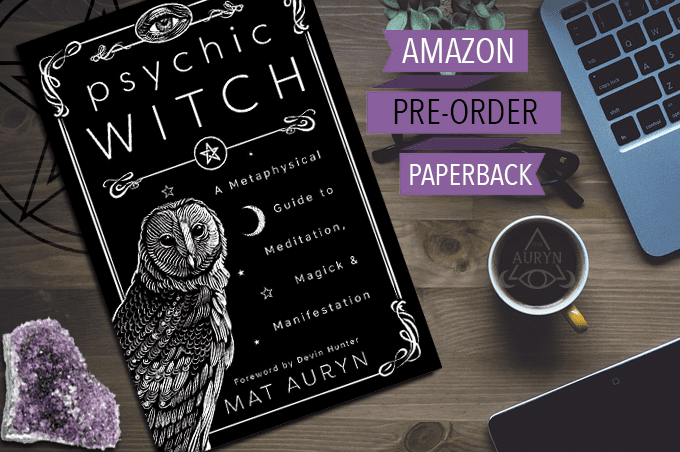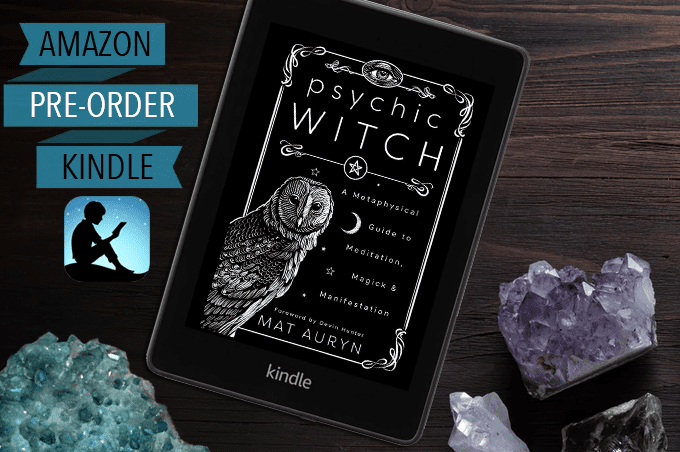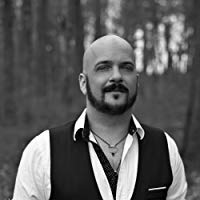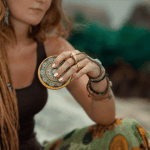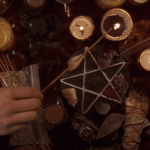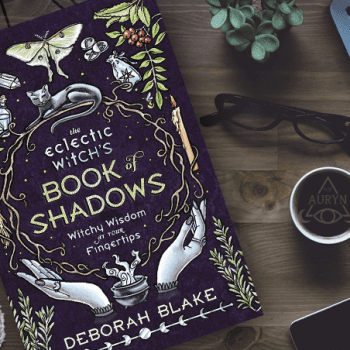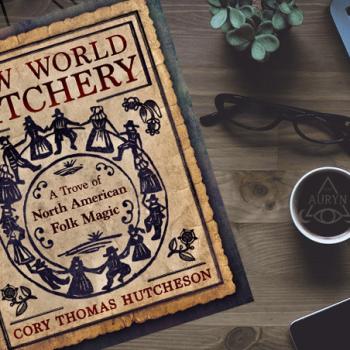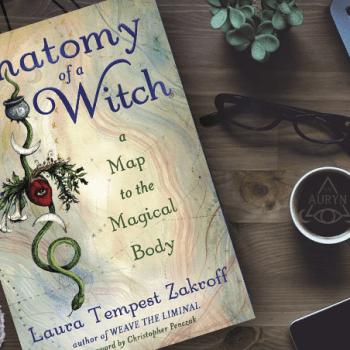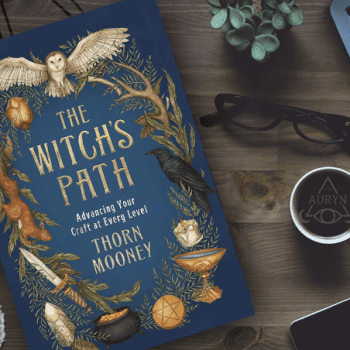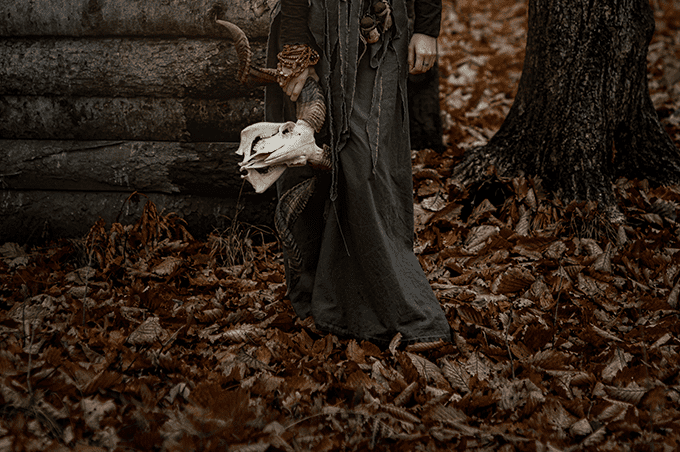
Tara-Love Maguire has been a practicing witch for over 30 years, on a path which has been crookedly influenced by Isobel Gowdie, Marie Laveau, and William S. Burroughs. Growing up as a weird kid in and around the New Jersey Pine Barrens, she found witchcraft within the tales and shadows that dwell there. She co-hosts the podcast, Down at the Crossroads, with her sweetheart, Christopher Orapello, and together, they founded Blacktree Coven – a traditional witchcraft coven which exists in the heart of southern New Jersey. Her first book- Besom, Stang, and Sword – co-written with Chris, is available now wherever books are sold from Red Wheel/Weiser Books.
For those who may be unfamiliar with Trad. Craft, how do you personally define the term “Traditional Witchcraft”?
I tend to use the terms “traditional witchcraft” or just “trad craft” as a shorthand (even further abbreviated as “TW” because I’m a lazyass witch)- I feel it’s a quick-and-dirty way of communicating non-Wiccan witchcraft. This usage has come to define a collection of mostly unrelated witchcraft traditions that developed outside the scope of what is thought of as being traditional Wicca and its many, many non-lineaged or public offshoots. Unlike those streams of witchcraft, which tend to be more ceremonial, coven/community-centered, and/or the members of which are a priesthood who generally follow an earth-based/seasonal fertility cycle, TW focuses more on an introspective, shamanistic version of witchcraft independently experienced with little to no emphasis on deity interaction. These paths may also differ from the Wicca-oriented ones in that they include seeking relationships with spirits -both land-based and otherworldly- instead of gods and largely don’t hold community-serving clergy status.
While this collection of traditions primarily leans in this direction- it is not a hard and fast rule. Of course not, why make it easy? So- some traditions under the umbrella of “trad craft” may indeed lean heavily towards deity work or observe an agriculturally-based year or think of themselves as clergy. Moreover, to make it even muddier- some forms of Wicca are less about deity communion and more about ecstatics or spirit work. The back and forth can go on forever.
The most important thing to remember in all of this though is that neither the Wicca-stream nor all its associated traditions (whether they want to call themselves “Wiccan” or not) nor any “trad craft” groups practice the most authentic form of witchcraft, though some (on both sides of the fence, not for nothing) will claim otherwise. Hilariously, it matters not a bit anyway- neither authenticity nor longevity actually dictates validity. Whether you are the swampiest of swamp witches with toads and thorns coming out your ears or whether you try to claim a bloodline of hereditary granny witches stretching unverifiably back to antiquity or even if you have a very fancy piece of paper connecting you to Alex Sanders’ grey-headed gramma- it simply does not matter. No one’s witchcraft is more witchcraft than other people’s witchcraft. Swing the other leg over and get off the horse already.
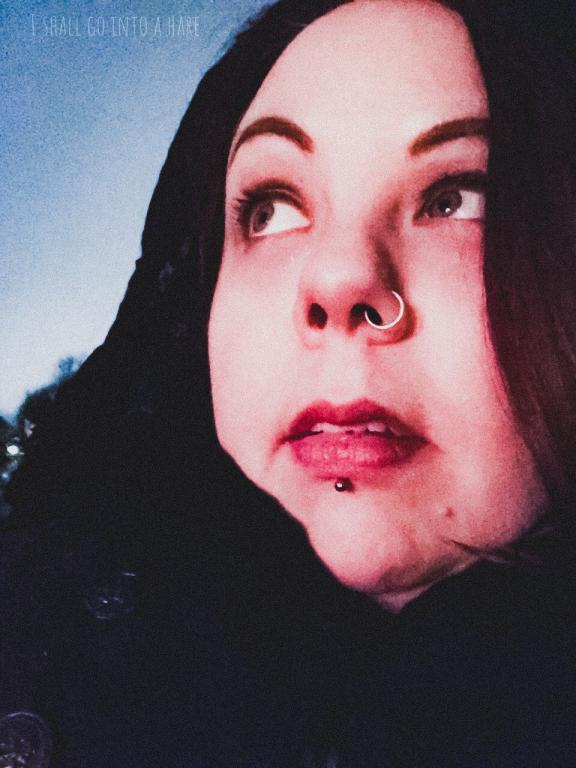
What drew you to Traditional Witchcraft as opposed to other forms of witchcraft, such as Wicca?
I kind of fell into witchcraft. I was an extremely precocious little girl who had already been seeing and hearing things that were not there since before I could really speak and I had already kind of created my own world in my head. My family moved house constantly, since we did not really stay anywhere longer than a year until much later and my single mother, who never should have had children in the first place, worked three jobs. When she wasn’t working, she went out dancing, so I was largely left to my own devices a very large part of the time.
Seeing and hearing shit that’s not really there marks kids as “other” pretty early in life, even if they change schools a lot like I did, so in addition to all of this- I also didn’t really have any friends. Bearing that mark of “other” always brings all of the associated viciousness of children, so being the type of resourceful and independent thinker that only arises from long-running familial neglect, I went looking for any means to change my situation myself.
Being a weird kid with no friends and little supervision, my subsequent book addiction brought me huge amounts of folklore and fairy tales, stories of gods and heroes and spirits and fairies. The good stuff, very bloody and romantic. Like most kids, I started with what was commonly available- the Greek and Roman gods, but I went on to devour every scrap I came across, no matter the region or mythology. It’s important to note that at this point, I’d also never really been churched all that much. Other than a last minute and half-hearted infant christening by a Lutheran priest whose doorstep I never darkened ever again, my religious indoctrination was meager and my viewpoint was largely a blank slate. There were some very vague notions of hippie hair Jesus and old angry men with beards who could see everything you did, but I’d naturally developed my own inherent moral compass using observations of the world around me in hand with these fantastical stories I was consuming. And it all eventually developed into this weird, little furtive witchcraft involving a lot of contemplation on how to get out of situations or how to give myself a better lot in life. It was instinctive, the actions of a wounded animal. I had an influx of pain that I could no longer tolerate. So, I had gone looking for justice, for protection, for good fortune. And I found the means to achieve those things in the stories. I found my way in the hearts and mouths of witches and bitter, cornered queens.
I didn’t actually hear about Wicca until much later- probably my late teens to very, very early twenties and it didn’t appeal to me all that much because of the included goddess worship that was just swinging into popularity at the time. I could see the appeal, but it wasn’t for me. It just wasn’t what I was looking for.
Aside from a few exceptions such as Laura Tempest Zakroff, Gemma Gary and Shani Oates, the world of Traditional Witchcraft seems to be pretty male dominated in regards to authors. What have been your observations and experiences as a female author on Traditional Witchcraft and is there anything you’d like to see change?
My experiences as a female author in TW are simply a mirror of the world at large- we live within an extremely oppressive (and repressive) patriarchal society where women and their opinions are frequently shunted aside, no matter the topic and no matter the woman’s expertise on said topic. I’m scarily used to it because as a woman, it’s simply something I’ve dealt with my entire life. It’s just a plain fact of existence. But, the things that I find the most frustrating are the little day-to-day type of things that happen. They’re not specifically always within TW, or even the broader witchcraft and pagan subculture, nor are they the big, flashy events that get the attention of the entire internet.
I don’t talk about it all that much because they can sometimes just be hand-waved away as simple negligence or misunderstanding. Mistakes are made all the time, right? But, here’s a brief list of instances I’ve experienced to quickly illustrate: my face has been covered up on promotional graphics, my name has been obscured by design elements in promotional materials, people constantly do not credit me in their references to the book or the podcast, I’m not listed as the co-author of the book in several places, my name constantly gets misspelled (while other more difficult names, usually male, aren’t misspelled), my author bio got rolled into Chris’ bio on some websites, I’ve been wildly patronized in conversation on topics I teach, I’ve gotten spoken over in interviews- the list could go on for days and it is almost invariably men who do these things.
Every single one of these situations could potentially be dismissed for reasons other than sexism, but the sexism inherent to our society is smeared all over it with big, greasy fingerprints and to ignore that very real fact is not only offensive, but foolish. The people with the mistake-type of offenses are usually some level of professional at what they’re doing and their typical work is consistently pretty solid. They’ve been doing what they do for a long time and, in my opinion, their work shouldn’t ever be this type of sloppy, not by any means. So, who puts some work together with a glaring and egregious error and says, “looks great, let’s roll!”?
People do indeed make actual mistakes though, all the time, and I can’t constantly fly around in my mortar and pestle, shrieking about how my fucking face got covered up again or how someone keeps misspelling my name. These are usually innocent mistakes, regardless of what’s actually fueling them, I recognize that. And I don’t believe these are deliberate slights by any means, most of them anyway. So every time it happens, I really only have two choices: I can either accept the mistake’s existence in the world and just ignore it or I can grit my teeth and smile pretty please to once again have something corrected that never should have been released incorrectly in the first place. If I shout, I’m a ball-breaking bitch. If I do nothing, I’m a pathetic doormat. I cannot win. Either way, I’m forced to expend energy I really don’t have to spare and for something that isn’t my actual responsibility.
And if there’s one thing I’ve learned from all of these experiences, it’s that having to constantly remind people of your presence is far more humiliating than the act of being forgotten about in the first place. It’s all so exhausting, but I try to keep my head up and continue moving. I don’t hold grudges against the people who’ve done any of these things, after all- they exist within the same exact patriarchy as I do and can only act within the bounds of their own programming. We are all imperfect people in an imperfect world, trying to do our best. But, I also don’t forget about them. I can’t! It’s still there. It exists. I see it, I experience it, and ultimately- it’s a hell of a grind-down. It utterly sucks, this constant confrontation of tiny interactions that tell you your existence simply does not matter enough for someone’s full and accurate attention.
And for anyone reading this who perhaps recognizes their behaviors in my words- I really don’t want apologies and I would vastly prefer to not even talk about it anymore than I already have. I’m not calling anyone out specifically, that’s not what this is about. Above all else, I just want these types of things to stop happening. I want action, not words. But, if someone thinks they’ve done anything like what I’m talking about in the past (not just to me, but to any other woman) and really just require some acknowledgement of it for their own edification, then post an image of Baba Yaga to your preferred social media profile. Instead of your voice adding to the conversation, put hers out there. And then try like hell to not do whatever it was that you did ever again. Sweep your porch and fine-tune your work so this shit stops happening.
One of the things I found so interesting was that the book focuses on the Witch Queen and the Witch Father while stating that they aren’t deities. Yet in explaining that they’re not deities, descriptions are given that sound like the descriptions of a deity. I’m always interested in people’s distinctions in things. In the end, whatever they are exactly is a moot point, but my curiosity is still piqued in regards to your personal views. Can you explain why you differentiate these two figures as not being deities? What I mean is, what in your view would make them deities?
By definition- deities are divine beings, assigned the status of gods- gods being superhuman beings or spirits worshipped as having power over nature or human fortunes. One would go to a god for favors or protection or blessing. Some people worship them, some people claim to only “work” with them. Witches and pagans everywhere love to put their own spin on the definition, we see it all the time in these types of discussions. Above all else though, deities are supernatural entities and supernatural, the very word, means beyond the laws of nature.
In addition to that, and it’s not an especially popular opinion, but- gods are utterly man-made. They would not exist without us, humanity gave them life. And all the same- what is created by humans, what is granted life at our hands and through our hearts, can thus die. Gods rely on the belief of humanity to exist and so, they can be forgotten. In addition to that, or rather- to bolster that statement, our species creates new gods all the time. Some already existing god is arbitrarily renamed because one group of humans stole a concept from another group, so what happens then? This act of cultural “borrowing” can entirely change the god’s identity and if enough people believe in that version, that version now has a life and history all its own.
With this in mind, the existence of a god predicates completely on human perception. Full-stop, they need us to live. Without any humans to worship a god, that god will cease to exist. If a god’s name is no longer found in recorded history or is lost to any living memory, that god is wholly forgotten and loses all power in this world. Maybe this is just my chaote heart speaking, but at their core, gods are really just jumped-up tulpas. We created them, we gave them their power- sometimes an awful lot of power and sometimes quite for the worse.
Now, the forces behind the masks of the Witch Lord and the Witch Queen are primordial land spirits. They’re not gods. They are not even supernatural. How can you be a being that transcends nature when you are, quite literally, nature itself? They aren’t worshipped or asked for favors and they certainly don’t need the attention of a human to bolster their existence. They simply don’t need us and whether we believe in them or not means nothing. For all the hand-wringing over how we’re destroying the planet, nature does not exists at humanity’s pleasure- it’s the other way round. If we were no longer wanted here, the land would remove us with little to no effort. Humans are a temporary inconvenience to the land and nature will exist long after humanity is but a restless memory.
The sculptures of the Witch Lord and Witch Queen are man-made and their creation was spirit-led, but as I mentioned before- those faces are only masks. Chris gave them anthropomorphic form when he sculpted them because that’s just what humans do. We’re amazingly self-centered and selfish creatures, artists especially so, and that means everything bigger than us has to look like us. Underneath the masks though, they’re still just parts of the land, parts of nature that can never truly die.
If there was only one thing readers take away after reading your book, what do you hope it is?
We’re not telling anyone that this is the only way to practice witchcraft and if you don’t practice it our way, then you’re a sucker. But, what we are doing is spelling out (heh) a definitive and nigh-exhaustive examination of the core workings of witchcraft as we’ve observed and experienced without the associated cultural decorations.
We’ve heard a little bit of grumpiness over some statements we made in Besom, Stang, and Sword regarding how witchcraft does not inherently require deities nor is it simply about magick or fertility cycles or the like and there was apparently this bristling of oh, except when it DOES. But, see- bristle or no, it still doesn’t. That word there inherently is critical to the statement. Witchcraft, in and of itself and for it to exist as a concept, most assuredly does not REQUIRE deity work to be witchcraft. Nor does it REQUIRE the observance of a fertility cycle. The key word is require. The key word is inherent. When you distill witchcraft down to its basest essence, you are able to parse out its six defined components, that’s the Six-Fold Path: history and lore; magick; divination; herbalism; necromancy; and hedgewitchery. You can add all manner of other things to this party to dress it up to your individual liking, but witchcraft has those six key features at its core and after they come together, all the rest of it remains just personal taste.
In making this statement, we aren’t saying that you can’t have deity work or fertility cycles or whatever else whathaveyou in your particular stream of witchcraft -by all means, have them, have ten! I wish you all the luck and love in the world with all the things you want in your witchcraft. And we also certainly aren’t saying that anyone’s specific witchcraft isn’t “real witchcraft” because they choose to include any of those aspects in their practice. To draw a line like that, like somehow we can pass down these ridiculous proclamations on what is the only truth, would be quite silly and self-aggrandizing, No one is the grand Pope of Witchcraft and to attempt to dictate such flies beyond the realms of mere tacky bullying and into the very clear territory of unmitigated douchebaggery.
So no- we’re not saying that it’s our way alone if you want to practice witchcraft. But, what we are doing is very clearly holding up a sign to direct any of the other wandering, weird kids who maybe resonate with witchcraft more in the manner we do and who haven’t been able to quite find their way out of the maze of Wicca books available to the mainstream market. If anyone likes what we’re doing and it jives with their heart- awesome, let’s party. But, if it doesn’t and someone just wants to keep doing their thing their way? That’s cool, too. You have fun doing your thing, I’m sure it’s a good thing! But, we’ll be over here doing our thing because our thing is a thing we quite like.
What advice would you give seekers of Traditional Witchcraft?
Embrace critical thought, don’t get bogged down with logical fallacies, and if you hear hoof beats, think horses first- wait on the zebras. Also- don’t believe anyone’s hype, especially not your own. There are no kings and queens of witchcraft, no heroes and no celebrities. Kiss no one’s ring.
What do you think some of the biggest pitfalls of Traditional Witchcraft are?
Largely- snobbery, cattiness, and gate-keeping. I’m not very visibly active on most social media all that much anymore, but I am absolutely still there and I read through people’s posts and comments on all manner of different walls and groups. The amount of sheer bitchery I keep seeing in particular sectors is just baffling in both breadth and scope. What is the point of it? Why are we spending all of this time getting puffy-tail at each other because some poor soul practices witchcraft differently than someone else and dared to write a blog post about it? It’s all grandstanding and very tiresome. The cults of personality that have built up in places have Greek chorus-ed their way into full-on sycophancy and I just don’t get it. If we could all just get out from under own feet, who knows what witches could truly accomplish?
You list both Emma Wilby and Marie Laveau as influences – which is a fascinating contrast. I know you have a personal history with Voodoo. Is there anything from your experience in Voodoo that you bring into your witchcraft in regards to praxis, worldview, or cosmology?
The time I spent immersed in Vodou inextricably shaped my worldview and how I treat my interactions with spirits and deities. From the moment I allowed my hand to be taken, it brought me a sense of not just the power that can come from working with those particular spirits, but of one’s own personal responsibility with such- both on a spiritual plane and the physical realm. My view of the soul and of the World Tree comes directly from how it is taught in Vodou and how I see spirit flight or journeywork derives from there. Vodou additionally blessed me with the direction to reach far back into my DNA and connect to ancestors whose names I never knew (or never will know), which is critical for someone like me who goes on to practice an ancestral-venerating system but has little to no actual blood connections or knows much of anything about my family line.
Learning about the history of Vodou and of Haiti (because there is no history of Vodou without Haiti) also enabled me to recognize the privileges I had been born with, even though growing up dirt poor and wildly neglected doesn’t really feel so privileged when you’re on the inside of it. But in learning the history of the Haitian people, of the African people, you learn how they were stolen from their lands and gods and families and brought to a foreign world. You learn how the people of Haiti were oppressed and raped and murdered by those in power, the atrocities committed against them by their own government and subsequently, by the rest of the world. It was eye opening. It’s also still going on to this day, in a variety of capacities.
I had the realization that what I had been doing for thirteen years, in continuing to refer to myself publicly (and sometimes, quite stridently) as a vodouisant while having no intention ever of committing fully to the path, was terribly short-sighted at best and actually quite racist when you get to the truth of it. So, I made the decision to let it all go- something I’ve spoken about quite often in other interviews, so I won’t go into all of the specifics here and now, but I let it go. I stopped claiming the name of vodouisant and ceased all direct working within that tradition. I completely stopped associating myself with that path.
Now, the relationships I forged with the spirits I worked with are still there, that’s not something that’s ever going to go anywhere- those connections remain no matter what else transpires and my hand was originally taken for reasons known only by the spirits who took my hand. One’s met tet doesn’t just disappear, it’s for life. So, I maintain my altars and offerings and do work with the lwa I’m close to as necessary or when drawn to. The changes to my perspective remain as well, the knowledge I learned and the work I did- again, not going anywhere. Vodou remains in my heart and it colors everything I do and say, but Vodou isn’t mine to write my name all over and it was really for the best that I stopped insisting otherwise.
One of the things I really enjoyed about your book was the emphasis on working with local spirits and love the part about your work with the Jersey Devil. Have you had any experiences with this spirit, outside of just incorporating it into your rituals? If not, are there any stories about local spirits that stand out for you?
Heh. Just about every kid in South Jersey has a Jersey Devil story and I adore them all. I don’t generally like giving the specifics of mine because in daylight, it always rings so false to my ears, it feels silly and somehow trite, but the gist of my story involves a teenage-ish camping trip and me wandering too far from the fire for too long. Long story short and vague- I heard something moving through the trees that was very large and very close to where I stood. It then went like this: I had what you could call an “interaction” with said large something, there was some panicked running, then I spent the rest of the night cowering under an overturned canoe until the sun started coming up and I felt safe enough to rejoin my site.
My friends all told me it had to have been a deer and I just smiled and agreed with them and laughed about how silly I had been. Ha-ha guys, Jersey Devil, amirite? Ha-ha. But, they didn’t see how big it was or how it just suddenly seemed to appear. They didn’t see it pulling form and shape and density from the shadows in the trees around it. They didn’t hear how loud its breath was or how hot it felt against the back of my neck. They didn’t hear the ticking of pointed claws on the walls of the canoe I hid under or how it seemed to go on for hours and hours. But yeah- you know, totally a deer.
What projects or event appearances can we look forward to from you?
There’s a few different words-on-pages projects that I’ve been fiddling with, poking at, and frowning over. None of it is concrete just yet because I don’t want to force anything, but they’re looming on the horizon. I’m also currently attempting to find time to get our side hustle, Two of Cats Apothecary, completely up and running online so people other than those in our local area can check out all of the herbal products we’ve been making. I did a soft release on Instagram, but still need to get everything situated in its permanent home. Beyond that, new installments of Down at the Crossroads are always being planned out and new interviews recorded. Our mini-episodes and DaTC Film Club seem to have both gotten a pretty happy response from our listeners, so we’re also going to continue doing those.
For things that sometimes happen out in the big, blue room- Chris and I have been invited to appear at TempleFest coming up in August this year, we’ll be there starting 08/22/19. I’m going to be presenting a new class that I’m writing called “Living in Liminality”, where I discuss safely navigating one’s practice when predisposed to mental illness. That is absolutely a conversation that needs to happen- especially in our current societal climate. We will also be at Philadelphia Pagan Pride Day in August and our own South Jersey Pagan Pride Day in October, both of which we always look forward to attending every year. In November, we’re a part of a big weekend event at Soul Journey in Butler, NJ that more information will be released when we get a little closer to that time of the year. Next year though, we’ve been invited to present at the Between the Worlds/Sacred Space Conference held in Hunt Valley, MD 04/09/20 through 04/12/20 – which has such an exciting line -up brewing that I’m simply flailing in anticipation of being there.
We’re definitely looking forward to the coming months being full of friends we never get to see because they live in other parts of the world and tons of witchy conversations, both in-person and on the show. I would also like there to be some time for sleep and gardening and reading books that aren’t about witchcraft or the occult, but we’ll see how that goes.
Tara also provided an awesome video for this interview showing how easily Vervain travels and a bit of a tour of some of the other plants she grows:
Related Articles:
Review: Besom, Stang & Sword
Down At The Crossroads With Chris & Tara
The Craft, The Devil, Familiar Spirits, and Validation
Connect With Me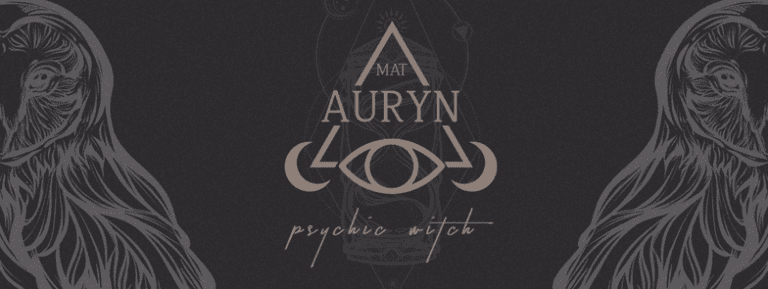
Psychic Witch: A Metaphysical Guide to Meditation, Magick and Manifestation

